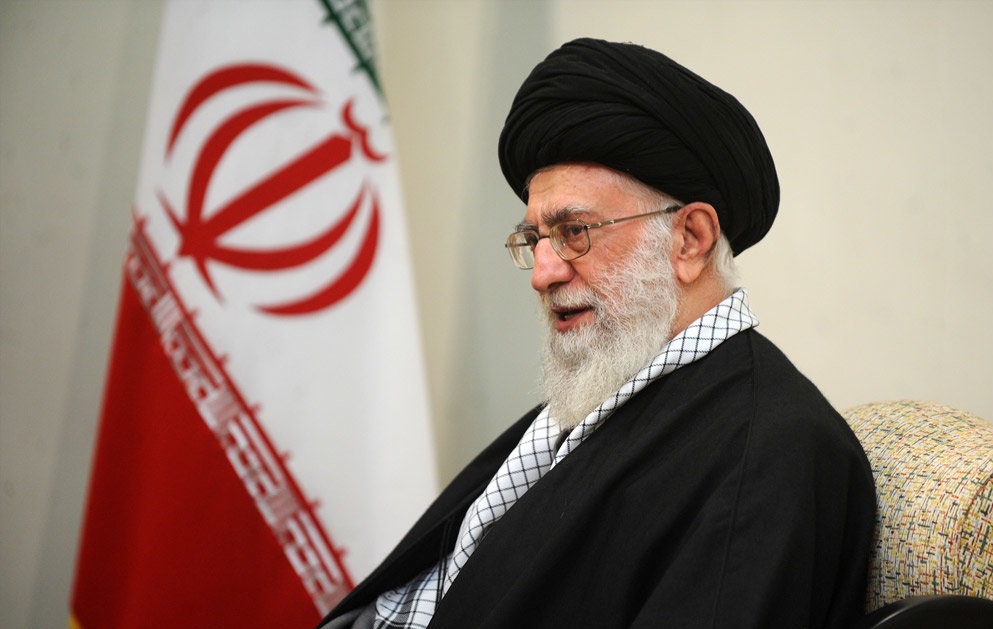Iranian Supreme Leader Ayatollah Ali Khamenei has criticized the interference of foreign countries, especially the US and Saudi Arabia, into the affairs of the regional countries, and has accused them of allying against Iran.
Khamenei also slammed a recent arms deal, worth nearly $110 billion, which was signed between Saudi Arabia and US President Donald Trump during his first trip overseas as president, from May 20-21. Khamenei described the deal as “an agreement with Big Devil aimed at the realization of American goals.”
"The U.S. president participated in a sword dance together with a leader of a tribal and backward system,” Khamenei said, referring to the traditional dance other US presidents have taken part in while visiting Saudi Arabia, “but criticizes the free [presidential] elections with 40 million votes of the Iranian people.”
At the Arab-American summit held in Riyadh on May 21, Trump openly accused Iran of supporting terrorism, and called on all nations to work together “to isolate Iran.”
“From Lebanon to Iraq to Yemen, Iran funds, arms and trains terrorists, militias and other extremist groups that spread destruction and chaos across the region. For decades, Iran has fueled the fires of sectarian conflict and terror,” Trump said.
One of the statements, issued at the conclusion of the summit, stressed “the need to stop Iranian intervention in other countries’ internal affairs,” while another called Iran’s ballistic missile program “dangerous.”
“Trump clearly said that he has sold billions worth of arms to create jobs for American youth, which basically means millions of people have to be killed in the region so that some Americans may get jobs,” Iranian Foreign Ministry Spokesman Bahram Ghasemi said on May 29.
After Trump's visit, tensions between Saudi Arabia and Qatar escalated because of an article in Qatar's state-run news agency in which the emir was quoted as criticizing the US, Saudi Arabia, and their allies for attempting to stir up tensions with Iran. Qatari officials say that the agency’s website was hacked, but the denial didn’t stop the rift from widening.
Two weeks after the Arab-American summit, Saudi Arabia, Bahrain, the United Arab Emirates and Egypt cut diplomatic ties and all land sea and air contacts with Qatar on June 5, accusing it of supporting terrorism and interfering in their internal affairs. Meanwhile, Qatar described this decision “unjustified and based on claims and allegations.”
Two regional rivals that compete for the leadership of Islam – Sunni Saudi Arabia, and Shia Iran – have tussled before.
Riyadh severed diplomatic relations with Tehran in January 2016, after Saudi Arabia hanged 47 Shia Muslims people, including a prominent Shia cleric, Nimr al-Nimr, after being convicted of terrorism offences. Following the execution, Iranian protesters stormed the Saudi embassy in Tehran, and the Iranian media had depicted Nimr as a peaceful dissident.
Riyadh is accusing Tehran of interfering in the domestic affairs of Arab countries and spreading its Shia revolution. Meanwhile, Iran accuses the Saudi military of killing civilians in Yemen through air strikes, and financing terror groups like Islamic State.







 Azerbaijan and Armenia started the process of demarcation of their border on Tuesday, with the installation of the first border markers based on ge...
Azerbaijan and Armenia started the process of demarcation of their border on Tuesday, with the installation of the first border markers based on ge...
 President Aliyev emphasized the critical role of the North-South Transport Corridor in fostering transport cooperation between Azerbaijan and Russi...
President Aliyev emphasized the critical role of the North-South Transport Corridor in fostering transport cooperation between Azerbaijan and Russi...
 Armenian sappers commenced on Monday mine-clearance operations in the territories adjacent to the Saint Mary Church in village of Voskepar (Armenia...
Armenian sappers commenced on Monday mine-clearance operations in the territories adjacent to the Saint Mary Church in village of Voskepar (Armenia...
 Russian Foreign Minister Sergei Lavrov has reasserted that Moscow has no intentions to stop the fighting in Ukraine, even if peace talks commence.
Russian Foreign Minister Sergei Lavrov has reasserted that Moscow has no intentions to stop the fighting in Ukraine, even if peace talks commence.
 Iran and Pakistan have signed eight cooperation documents in various fields, and agreed to strengthen ties to fight terrorism in the region.
Iran and Pakistan have signed eight cooperation documents in various fields, and agreed to strengthen ties to fight terrorism in the region.



